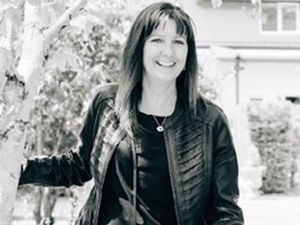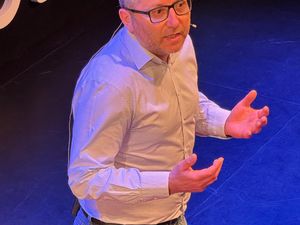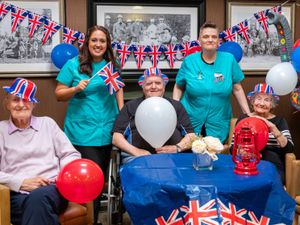Hard work pays off for Jacqui Oatley as new adventure begins
The journey has been a long but rewarding one for a local girl who has achieved big things.
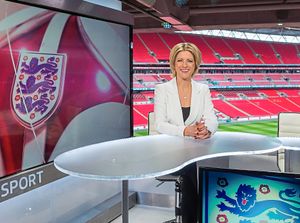
Jacqui Oatley has been a leading and influential figure in broadcasting over the last 21 years and shows no sign of stopping or slowing down as she embarks on a new adventure.
The commentator, presenter and podcaster is starting a new challenge commentating on matches for the National Women's Soccer League (NWSL) in the United States, with regular trips to and from her current home in Surrey to commentate on matches for CBS.
Having been the first female commentator on American play-by-play commentary at the 2022 World Cup in Qatar for Fox Sports, Jacqui is well-known to American audiences and said it was an honour to be asked.
She said: "It's really exciting and came about as they've heard me commentate to a US audience at the World Cup and I've had some lovely feedback from the US audience, so CBS contacted me wanted me to be part of the new commentary team for the coverage.
"They've really upped their game this season in terms of what NWSL is looking to achieve on a broadcast front, so it was fantastic to be asked and I was really surprised as they were so keen and lovely about wanting me to join them.
"It was a fairly easy decision to be part of it and fly over to do two or three games a weekend and still be available for games here and it's really nice to to be part of something and part of a team that wants to achieve something."
Being able to sit in a cafe in Fort Lauderdale before commentating on football matches has become a regular occurrence for Jacqui, having been part of multiple tournaments and Olympic games since taking a chance and going into journalism in 2002.
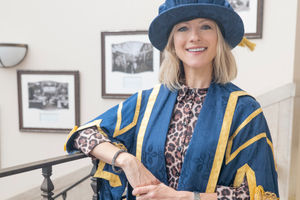
Born in Wolverhampton and growing up in more leafy surroundings near the Shropshire border in Codsall, Jacqui said the idea of becoming a journalist or commentator had never occurred to her, despite her passion for football and support of Wolverhampton Wanderers.
She said: "When I was living in Wolverhampton, I was a girl amongst girls for 10 years of school, then around boys at sixth form, but it never came up in conversation.
"My football passion and obsession was all-consuming, but I was very much the outlier and I didn't know anyone who was a journalist, or who interviewed footballers or did anything like that one, so it never occurred to me then.
"It was only when I'd started a career in intellectual property via my language degree and I knew that wasn't what I wanted to do forever and I had this football and sporting obsession that I felt drawn towards, but didn't know how to translate into a career."
Jacqui said she spent a lot of time studying biographies of people working in the industry and saw how a lot of them had done journalism courses, which she said was the spark for her to do it in 2002.
She said: "After reading those biographies, I thought that's something I need to look at and, maybe, I could do a postgraduate diploma in broadcast journalism, and things started to fall into place.
"I felt it might be something I would enjoy and would be suited to, so did the research and ended up applying for courses and by the time I had applied, there were only a couple of places left on the Sheffield course, so I raced up and had an interview and they offered me a place.
"As soon as I started there, I was a woman on a mission in a hurry and wrote to all the local BBC stations and said I was a mature student and could I come in and see them.
"I wasn't looking for jobs or anything and hadn't started my post-grad yet, but BBC Leeds TV news department gave me two days work experience and that was my big break, getting through the door and getting in front of and speaking to people.
"They could see I was genuine and that I was really keen and willing to do whatever it took and that really was my big break."
Jacqui said the focus for her had always been to be a football reporter, but also spoke of her love for sports such as golf and snooker, speaking of an obsession with the World Snooker Championship and how special it was to cover the championships for BBC Five Live in 2004.
The move into journalism saw her work for BBC Leeds during her studies and after graduating, throwing herself into all the sports covered by the station and doing as much work as she could throughout her time there.
She said: "I worked every minute of every day and it wasn't a case of changing careers and having a home lifestyle where I worked nine to five and had weekends off and I moved up to Sheffield, then Leeds and worked every minute.
"I think what happened at BBC Leeds was I progressed much more quickly as I was doing so much more work every single day as, at Leeds, you were doing the sports bulletins in one little, mini-studio, writing and rewriting copy for four different radio stations at Leeds, Sheffield, Humberside and York.
"I would be in a box all afternoon on my own writing and re-writing copy, which I love doing anyway, and I freelanced everywhere, with BBC WM briefly, then BBC London and did overnight sports bulletins on my own on Five Live, so I learned so quickly how everything works and crammed so much into a short period of time."
As well as the work she was doing in local radio with sports bulletins, Jacqui was also given the opportunity to start commentating on non-league football, something she described as a brilliant grounding and something everyone who wants to do the job should take advantage of.
She said: “I think some people come in and bide their time for a big club, but I wasn’t interested in that and wanted to learn my trade.
“I also think that starting late as a mature student helped me as I had travelled around the world and learned a lot of life skills and the skills you need to be a journalist by meeting people, being put in difficult situations and overcoming a lot of adversity.
“I think that really helped me as a grounding when I was doing non-league football and women’s football and I was always freelancing and that helped me to progress.”
That grounding led to regular work with Five Live commentating on the Premier League, as well as commentating on matches at the 2005 Women’s European Championships in England, before becoming the first woman to commentate on Match of the Day.
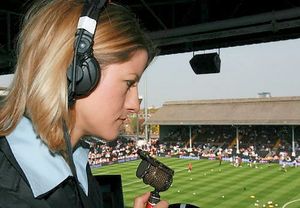
That moment, where Jacqui was the commentator for Fulham vs Blackburn Rovers on the programme in April 2007, has been spoken about and analysed many times and Jacqui said she had done multiple interviews about it.
While a significant moment in TV football coverage, it was only part of the journey for Jacqui, a journey which seen her cover 14 major tournaments, from the Olympics to the men’s and women’s football World Cups and European Championships.
She said she had to pinch herself sometimes when she thought about all she had done in the last 21 years.
She said: “It’s all been absolutely brilliant for the experiences and I really do pinch myself every time that I’m asked to commentate and the fact that I’ve done all the roles.
“I remember when I did the 2007 Women’s World Cup in China in 2007, the BBC only sent me in terms of the TV commentary team, and I’d also be doing Invision TV, doing the team news, then running up to the commentary box and do the commentary for Five Live Sports Extra on my own.
“I’d also be dipping into Five Live and I remember Vassos Alexander asking me for updates on the England matches, so I’d have to weave that in during my commentary, doing a 30 second update, then finishing the match and running down to do post-match interviews.
“It’s grown a lot since then, in terms of the personnel, but all those experiences of doing all the roles helped me have a really good understanding of how our industry works.”
Being a woman in what had been a male-dominated industry for so many years, Jacqui said she had received tweets from people making sexist comments such as telling her to get back in the kitchen.
She said that at the time she started, people may felt freer to make those type of comments, but she would challenge those people and those attitudes more often.
She said: “I don’t think people feel are free to express it now, but that’s how it was then because people in society felt a lot more free to be sexist and misogynistic, just like how perhaps a decade earlier, people may have used racially insulting terms, which soon became unacceptable.
“I think sexism is the last bastion, in a way, that has almost been more acceptable for longer, whereas people suddenly realised that racism is absolutely not acceptable and will be massively clamped down on and made a sackable offence.
“I’ve had tweets from men who are holding their baby girl or playing with their little daughter in their avatars saying things to me and I will always get back to them and say ‘Hang on a minute, you’ve got a little girl. Do you really want her to grow up and have those kinds of views, depending on what job she decides to do?’
“Often, they apologise or backtrack or it’s helped them see something they hadn’t really expected because they’d never seen it that way and always seen it as a free-for-all to slag off women.
“Nowadays though, I don’t really get it and I commentated on the last Men’s World Cup for an American audience and turned off my notifications as I really needed to concentrate, and when I turned them back on, I was pleasantly surprised and they were so welcoming and lovely.”
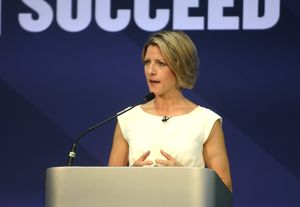
The work goes on for Jacqui, with presentation of PDC Darts events for ITV, as well as commentary on the FA Women’s Super League and more work with American networks, such as with Fox Sports for the 2022 World Cup and CBS for the National Women's Soccer League.
She said it was about keeping busy and being there to help others that continued to drive her in her work and making the best of opportunities.
More than 20 years into the job, Jacqui said the biggest achievement for herself wasn’t so much about commentating on TV or doing World Cups, but were around overcoming adversity and surrounding herself with lovely people, including her husband Jamie and children Phoebe and Max.
She said: “It came from a period of being very unhappy and miserable and really not knowing what I was going to do in life, as well as overcoming various hurdles of adversity in different situations.
“That could be in my 20s, starting a job that wasn’t for me, or overcoming the knee injury I go playing football which precipitated the career change, being on crutches for 10 months and at the end of my tether with a job
“I’ve very lucky to have an amazing and support husband and don’t know how I’ve managed to find a husband who will let me go off to Florida for 10 days and commentate on five football matches while he looks after the children.
“I have two lovely, well-adjusted and fine children as well and I think that’s my biggest achievement.”

